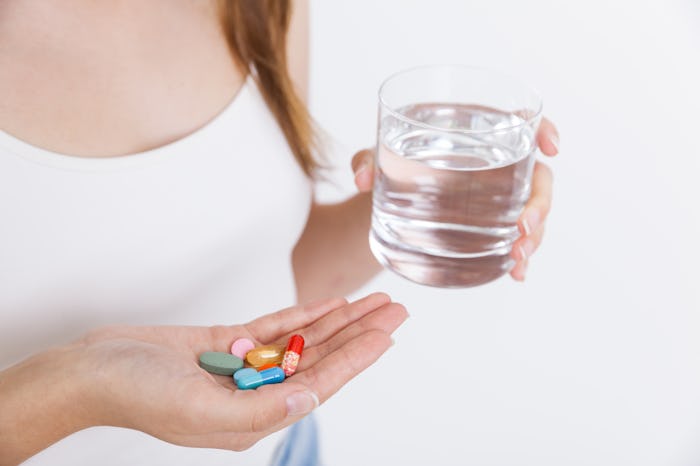Life

9 Reasons To Take Your Postpartum Vitamins
Almost everybody is familiar with prenatal vitamins. It's hard to miss the aisles of them that line most every pharmacy. But it's important to remember that your need to maintain excellent health doesn't disappear the minute you give birth. In fact, the things that happen to your body if you don't take vitamins after giving birth can get pretty alarming. Maintaining your health may be more important than ever now.
Of course, it's always best to get your vitamins straight from your food. But in the whirlwind of those newborn care days, you're sometimes lucky if you have time to pee, let alone enjoy three nutrient-filled meals a day. That said, self-care is still vital during this phase of life, and that goes for your dietary needs as well. Basically, you'll need a ready stock of basic vitamins, minerals, and other healthy foodstuffs to make sure you have the energy and strength to care for a newborn. What's more, you also want to make sure your body is ready and able to recover from the intense experience of childbirth. Continuing to enjoy a varied, healthy diet (as much as possible), and taking supplements when necessary, can help make sure everyone in your family is in tip-top shape.
Yes, it's annoying to add yet another item to your postpartum to-do list. But if you skip your vitamins post-delivery, here are a few things that can happen.
1You Feel Weak & Extremely Fatigued
Childbirth does a number on your body, so feeling tired is pretty common. But if you feel exhausted beyond measure, then the culprit may be an iron deficiency from giving birth and blood loss. According to Baby Center, taking an iron supplement could help you get back on your feet. Because taking care of a newborn requires all the energy you can muster.
2You Suffer From Tinnitus
Sometimes the symptoms of nutritional deficiencies are kind of bizarre. If you experience a ringing in your ears (AKA tinnitus), then it may be another sign of iron deficiency, as further noted in Baby Center. This particular mineral is crucial to your well-being.
3Your Muscles Cramp
So how often in your daily life do you consider the need for magnesium? Well, it's another crucial mineral. According to Psychology Today, a lack of magnesium may result in muscle cramping and even arrhythmias. And, although this idea still requires more research, magnesium intake may even help new mothers ward off postpartum depression, as further noted in Psychology Today. Basically, magnesium is magnificent.
4You Could Suffer Postpartum Depression
Vitamin D does a whole host of wonderful things for your body. And recent research has shown that there may be a link between between immediately consuming vitamin D after giving birth and warding off postpartum depression, as reported by the Vitamin D Council. (NOTE: this is not to say that vitamins alone are the best way to cope with PPD. It's simply noting a potential for vitamin D to help protect new mothers against depression. If you suspect you're suffering from postpartum depression, then don't hesitate to reach out for help immediately.)
5You Bruise Easily
OK, so this one may be a bit of a stretch, especially if you don't live on a boat. But according to a 2008 study in the Journal of General Internal Medicine, it's possible for persons in developed countries to get a vitamin C deficiency, despite the availability of fortified foods. (Granted, it's pretty uncommon). As noted by Fit Day, signs of vitamin C deficiency may include easy bruising, chronic joint pain, and dry skin. Getting all the vitamins is exceptionally important for new moms.
6You Feel A "Pins And Needles" Sensations
This is a weird one. But according to Prevention, if you're low on B12, you may feel little electric shocks running through your body. Oh, and this sensation may be due to nerve damage.
7Your Muscle Weaken
Do your formerly strong muscles feel like jelly lately? Such muscle weakness may be a sign of a vitamin E deficiency, according to the University of Maryland Medical Center (UMMC). And as further explained by the UMMC, vitamin E is also what helps your body manufacture red blood cells, so it's definitely a crucial vitamin.
8Your Hair & Nails Weaken
The good news: breastfeeding is hella healthy for your kid. The freaky news: your body may leech calcium from your own bones to make sure your breastmilk has enough calcium for the little one, as noted by the National Institutes of Health. (Seriously: motherhood is metal). If you have calcium deficiency, then you may experience symptoms such as weak hair and nails, according to Health Line. Fortunately, you can get calcium supplements during this time to keep your hair and nails strong.
9You Suffer Memory Loss
Sure, mommy brain is a thing. But if you're having more concerning moments of memory loss, then this may be another sign of calcium deficiency, as explained on Healthline. To be on the safe side, you may even want to visit your doctor to make sure your general diet and supplement regime is up to the rigors of parenthood.